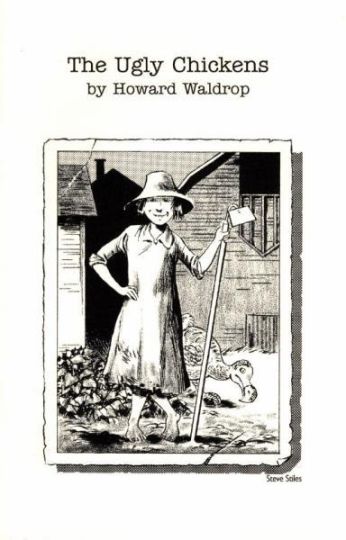Prolific and talented, Howard Waldrop has been one of science fiction’s great treasures since his first story was published in the 1970s. His fiction has earned him a steady flow of nominations and award wins. If he is obscure, it is because he works for the most part in short lengths. He has just two novels to his credit, the most recent one 33 years old.
With so many works to choose from, which of Waldrop’s stories to pick? “The Ugly Chickens” seemed like a safe bet; the setting is comfortably mundane and it won both the Nebula and World Fantasy Award, as well as garnering nominations for the Hugo, the Locus and the Balrog. I’ve been wrong before; what did the Young People actually think?
Now that’s was science fiction. That is, fiction about science. No flashy future tech, no space or time travel, set in the past (probably present when it was written). Just a what-if story about a scientific oddity. This brings to light that the “science” in the science fiction I’ve read is almost exclusively physics. Rarely chemistry, never zoology.
It’s an interesting tale about the process of tracking down a lead. Similar to journalism stories about traveling the world to strange backwoods places in search of confirmation for hearsay.
This story sets it’s sights low enough that it maintains a plausibility even now decades after publication that science fiction rarely holds onto, or even achieved in the first place.
—Jamie
This story was low on action and high on stream-of-consciousness. Which is not necessarily a bad thing. Except in this case, the stream of consciousness reads like the fever dream of a Moby Dick academic who won’t shut up after you politely asked what their field of specialty is.
It doesn’t help that reading this story reminded me of English literature class in university. Specifically, I felt like I needed a class of lecture and discussion just in order to understand and research the relevant American history and world history references. Those are both areas where I lack knowledge. Plus, terms like “sleeve blotters” tripped me up – which I am normally fine with looking up myself (it’s like a fun treasure hunt), but combined with the opaqueness of references, it made the story less enjoyable to me because I knew I was missing a lot when I read it. E.g. What exactly does he mean when he says he feels like Oedipus in speaking to Annie Mae Gudger?
If this story is intended to be enjoyed for the atmosphere of another world — like how Huckleberry Finn can be enjoyed for the sense it gives you rather than the specific meaning of everything – then I did not get that sense.
I will say that the story did a good job portraying a sleep-deprived student in their mid-20s chasing after academic prestige. That part seemed quite accurate.
I remember being fascinated by the idea of dodos as a kid. Perhaps this was written during a time when many people were fascinated by dodos, but now it seems a little stale.
Like the fragment sitting in The British Museum, this award-winning story is disappointing when actually observed up close.
—Mel
I hate the narrator of this story. The entire time I was reading this I just wanted it to be over. I found the narration and the character extremely irritating, and I wanted him to fail because I dislike him so much.
I don’t think I would have particularly enjoyed the story with a more likable narrator. I’m not generally a fan of this style of story anyway, but it didn’t matter because I was pretty much done by the third paragraph. I found the narration style grating, and disliked his attitudes and his actions. This is a very long story to read when you’re hating it the entire way through.
I think the story felt like it could be intended as a period piece written recently. If I didn’t know going in that this was an old story, I don’t think I would have been able to tell. Saying that, I can’t figure out what’s supposed to be speculative about it. It’s maybe alternate history, but it doesn’t feel particularly like science fiction to me.
—Mikayla

